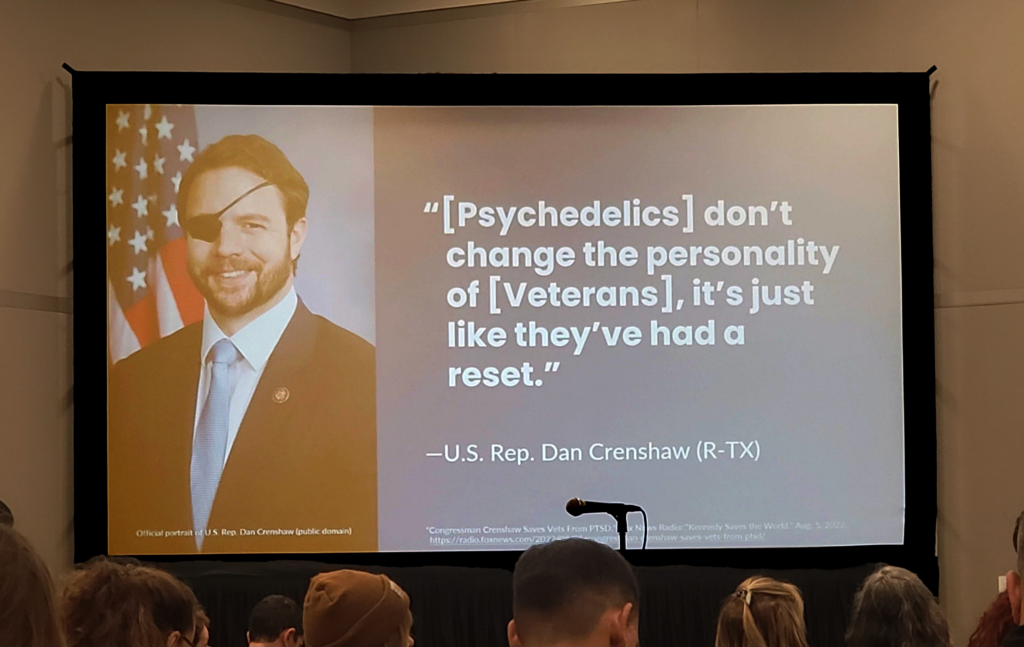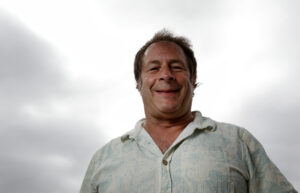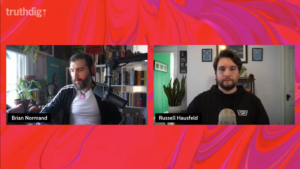Building Better Killing Machines — With Ecstasy!
Rick Doblin, the pioneer of MDMA therapy, advocates for dosing soldiers upon enlistment. Graphic by Truthdig
This is Part of the "The Ecstasy of Agony" Dig series
Graphic by Truthdig
This is Part of the "The Ecstasy of Agony" Dig series
Rick Doblin, founder of the Multidisciplinary Association for Psychedelic Studies, has made a career of pitching psychedelic drugs to conservatives. Since the 1980s, he has attempted to pave inroads with the political right and the United States military in order to mainstream drugs like MDMA.
This strategy of pushing the cultural narrative around psychedelics rightward — from “Drop Acid Not Bombs” to “Drop Acid to Better Drop Bombs” — has clashed with many long-term psychedelic advocates less aligned with U.S. militarism. Regardless, Doblin has continued to fine-tune his pitch to the military. The messaging can be broken down into three distinct periods. At first, the goal was to use psychedelics to heal veterans (as indicated by MAPS’s public relations between 2005 and 2012). Then, in 2012, Doblin shifted to suggesting that psychedelics might be used to heal traumatized active-duty soldiers. Now, MAPS’s founder calls for military recruits to be dosed upon enlistment.
This latest turn was announced during a presentation Doblin gave at this year’s SXSW conference, entitled “The Future of Psychedelics: Drug Development and Policy Reform.” During this talk, Doblin discussed using MDMA to “treat people closer to the trauma.” This, he implied, could prevent soldiers from leaving the military with disabilities or being discharged. Doblin then suggested dosing new recruits with MDMA could help create more efficient soldiers.
“It turns out that a lot of the people that volunteer for the military have had childhood traumas,” Doblin said. “So, it would really make more sense to do MDMA therapy as they started in the military to make them less reactive, more able to handle whatever circumstances come their way.”
Doblin then suggested dosing new recruits with MDMA could help create more efficient soldiers.
From the perspective of many disillusioned MAPS supporters, this is the “mask-off” moment in Doblin’s crusade to integrate psychedelics into the U.S. military. In recent years, it has been challenging to find a presentation by Doblin that did not involve the possible benefits psychedelics might bring to the military. He increasingly relays psychedelic anecdotes of prominent right-wingers, many of whom are also his donors.
At his SXSW talk, he told the crowd that he recently heard a story of a very prominent, unnamed conservative who used LSD in their youth. “I was shocked to hear that…they are still a conservative person,” Doblin said.
He then gestured to his PowerPoint slide displaying an image of Texas Rep. Dan Crenshaw. “[Psychedelics] don’t change the personality of [veterans], it’s just like they’ve had a reset,” read the accompanying quote. Speaking on Crenshaw’s behalf, Doblin explained this to mean that giving psychedelics to a veteran will not automatically make them embrace “peace and love and [putting] down their guns.”

Dr. Neşe Devenot, a psychedelic researcher at Johns Hopkins who also presented at SXSW, wrote critically about Doblin’s presentation on their Substack, “Chemical Poetics.” In their write-up, Devenot asserted that psychedelic industry leaders like Doblin have “been happy to talk out of both sides of their mouths” to sell their industry to the mainstream. They are equally as likely to endorse assertions that psychedelics will or will not make people more prosocial, peaceful and less militaristic depending on their audience and what suits their pitch in the moment.
“In addition to my concerns with the MAPS therapy itself…Doblin’s vision of serving maintenance therapies to the imperial war machine would likely worsen the root causes of global trauma and inequality,” Devenot wrote. They noted that it has been documented that childhood poverty — a systemic trauma-inducing issue — is associated with entrance into the military. This, of course, did not make it into Doblin’s talking points about the high rates of traumatized military recruits.
“In addition to my concerns with the MAPS therapy itself…Doblin’s vision of serving maintenance therapies to the imperial war machine would likely worsen the root causes of global trauma and inequality.”
“Their entire corporadelic machine is premised on the notion that they are experts on trauma, when it’s clear to impartial observers that they aren’t engaging with the systemic and coercive root causes of trauma,” Devenot wrote. “Although I acknowledge that psychedelics have a lot of positive potential, I actually think that MAPS’s…and now Lykos’ [a for-profit company that used to be owned by MAPS]… approaches are less likely to lead to prosocial and pro-environmental outcomes than other possible [approaches].”
It is historically revelatory that Doblin — arguably the world’s most prominent salesperson for psychedelic medicine — feels the need to consistently assure audiences that psychedelic users will not be more likely to put down their guns and embrace peace and love. Doblin’s pitch has morphed from aiding military veterans with their post-service re-entry into society, into using psychedelics for military performance enhancement — in creating soldiers who are “less reactive” and “more able to handle whatever circumstances come their way.”
While many former allies may find Doblin’s comments shocking, the writing has been on the wall for years. As I noted in my 2022 investigative series for Truthdig, Doblin has long been explicit about his hope that partnering with the military — against the wishes of many of his original supporters — would lead to funding opportunities. As early as 2014, he was calling treatment of veteran PTSD the “foremost” opportunity on the horizon for his organization. It should come as no surprise to anyone who has been closely observing Doblin that he has leaned completely into a growth strategy of entwining MDMA therapy with U.S. military values, practices and objectives.
Your support matters…Independent journalism is under threat and overshadowed by heavily funded mainstream media.
You can help level the playing field. Become a member.
Your tax-deductible contribution keeps us digging beneath the headlines to give you thought-provoking, investigative reporting and analysis that unearths what's really happening- without compromise.
Give today to support our courageous, independent journalists.






You need to be a supporter to comment.
There are currently no responses to this article.
Be the first to respond.